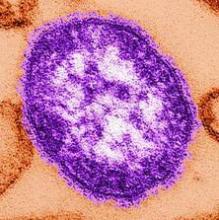A significant number of parents were unaware of the 2014-2015 United States measles outbreak despite significant media attention, according to Michael Cacciatore, Ph.D., of the department of advertising and public relations at Grady College, University of Georgia, Athens, and his associates.
In a pair of national surveys of parents with children less than 5 years old, 53% (n=523) reported awareness of the measles outbreak centered at Disneyland in California and 33% (n=332) had no knowledge. The remaining 14% responded “don’t know” and were excluded from further study. Parents who were aware of the outbreak were more likely to be white, older, and slightly better educated.
Parents who were unaware of the outbreak had fairly high levels of vaccine confidence, but also had the highest levels of concern regarding vaccination, and were most likely to skip recommended vaccinations. Parents with low awareness had fairly high confidence levels, low levels of concern, and were most likely to have their children vaccinated. Parents with high levels of awareness had the highest level of confidence, but also had fairly significant levels of concern; “this suggests those paying most attention to vaccine-preventable diseases fall into both the vaccine proponent and vaccine skeptic camps,” Dr. Cacciatore and his associates found.
“Highly visible or publicized outbreaks can positively affect awareness, intentions, and support for public health measures, but those responsible for informing and guiding public or parental actions need to recognize that their efforts must continue to go beyond traditional news media. In today’s crowded communication and media landscapes, individuals have much flexibility and great freedom in the types of information they view; thus, even major public health events are not guaranteed to reach all audiences, including those most in need of the information,” the investigators concluded.
Find the full study in Health Affairs (doi: 0.1377/hlthaff.2015.1093).


